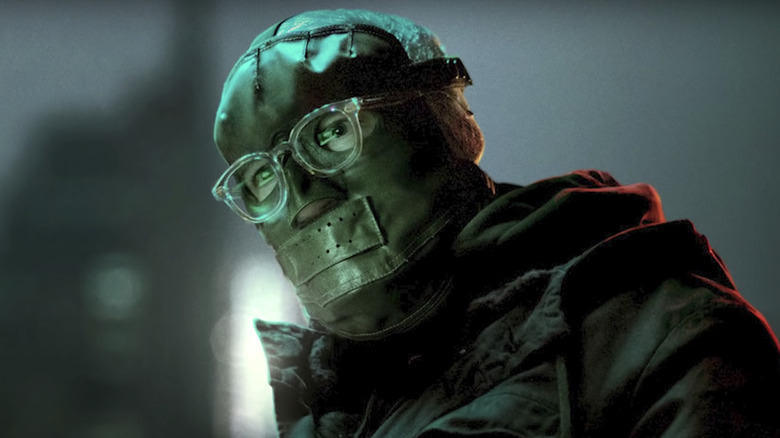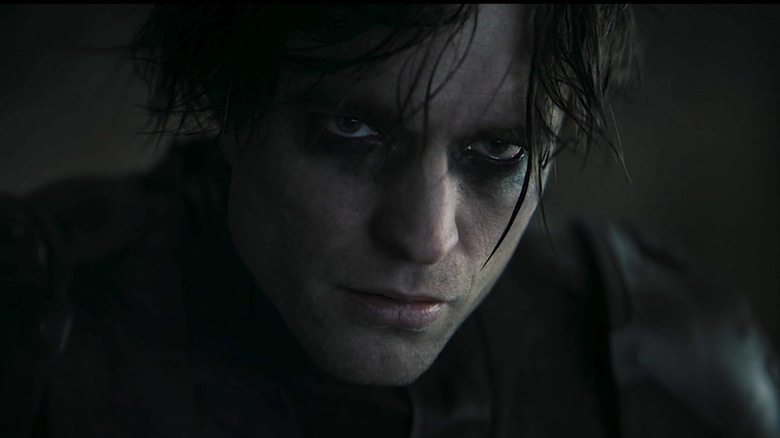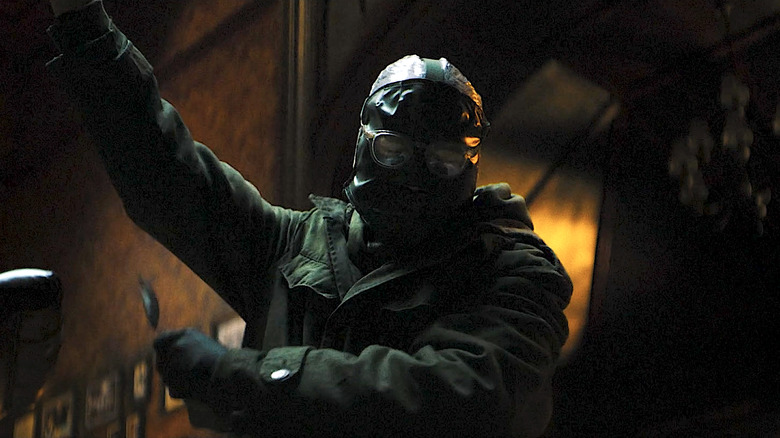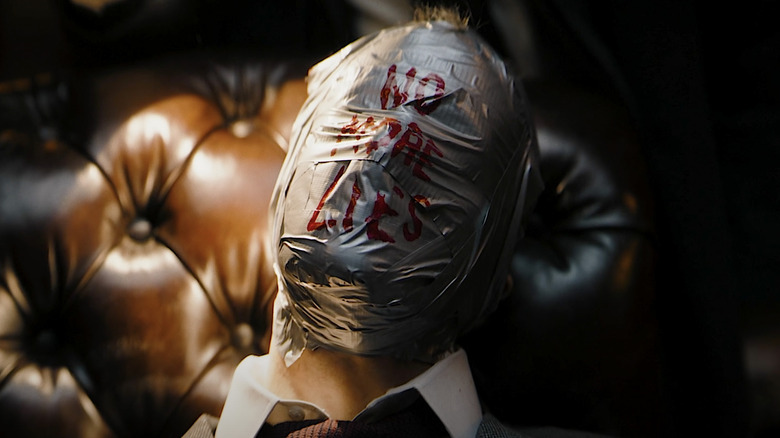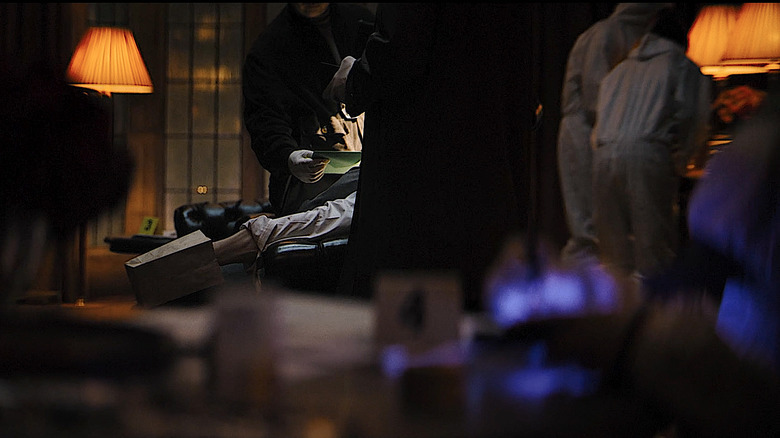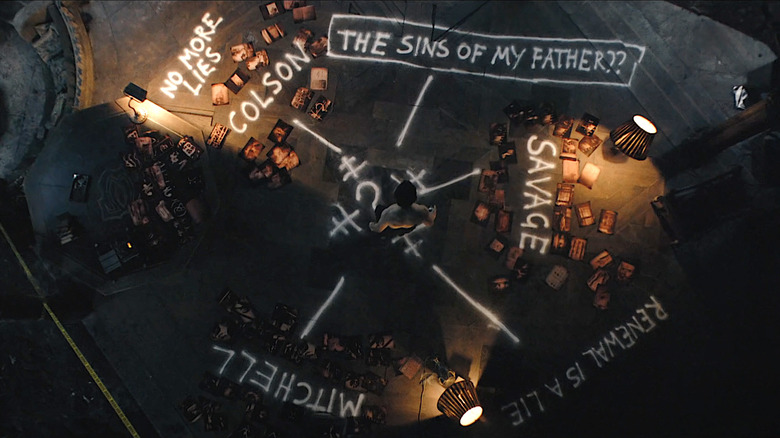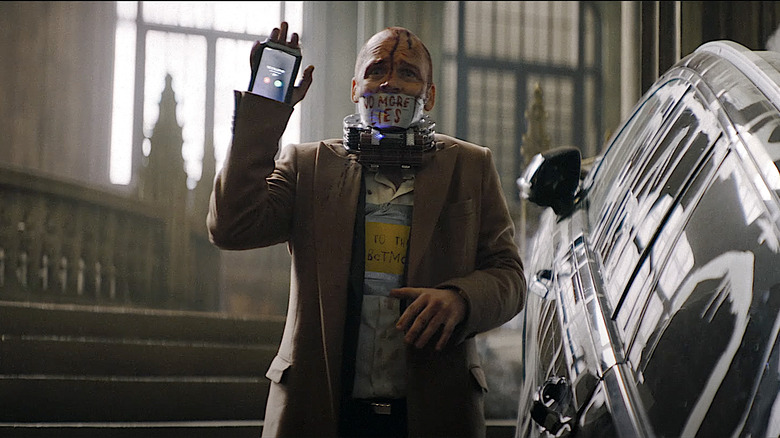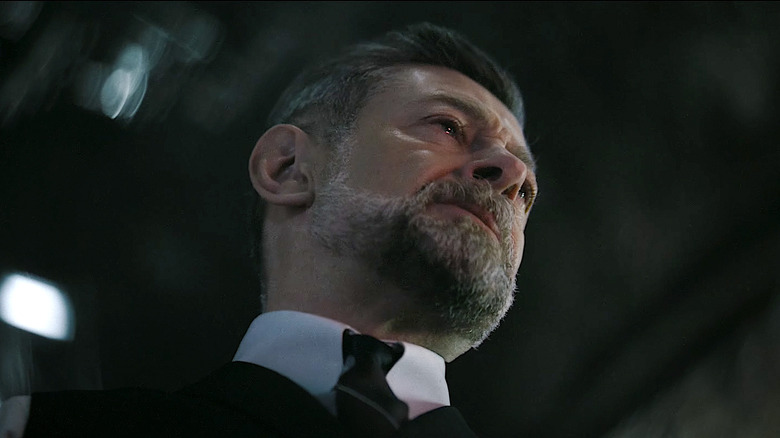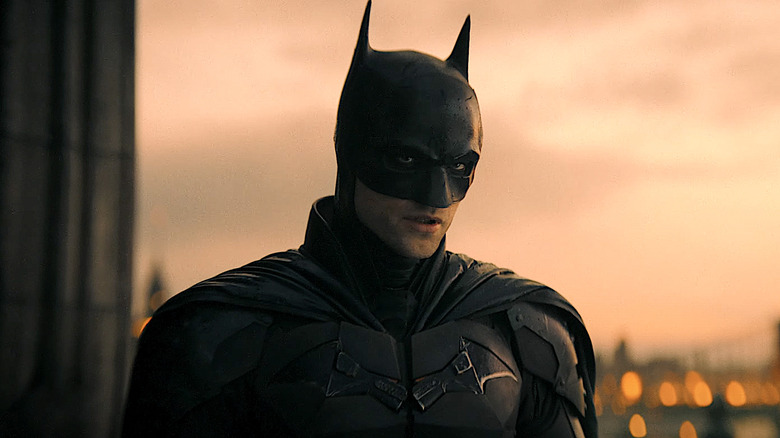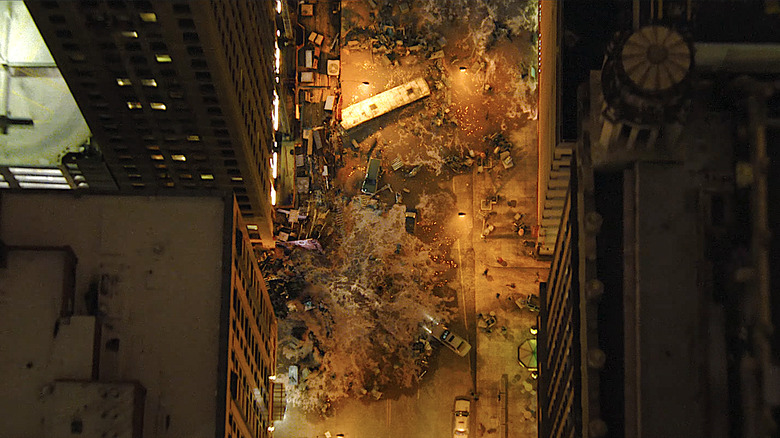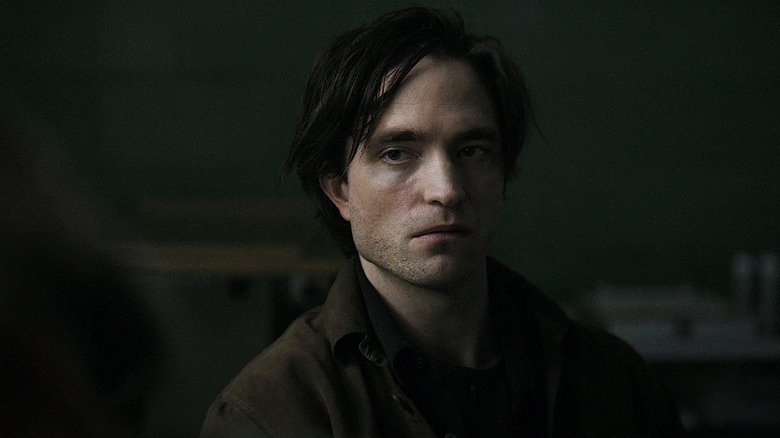The Riddler's 10 Darkest Moments In The Batman Ranked
With "The Batman," director Matt Reeves has lovingly cribbed David Fincher's masterpiece "Se7en," (with a touch of "Zodiac," too) finally giving us the Caped Crusader in full film noir detective mode. Robert Pattinson's volatile Batman is in the Brad Pitt role. Replacing Morgan Freeman's old-salt detective is the excellent Jeffrey Wright as Commissioner Gordon. Kevin Spacey's missionary serial killer, John Doe, is played here by a similarly round-faced character actor, Paul Dano. This Riddler is both serial killer and supervillain and every bit as twisted and methodical as the deadly sins-obsessed maniac who put Gwyneth Paltrow's head in that box.
The Riddler has never really worked in a Batman blockbuster before. Ever since the gothic gravitas of Tim Burton's "Batman" in 1989, the best films have avoided this more comic-friendly character. Christopher Nolan's realistic take on Gotham certainly had no place for Edward E. Nygma. The character has been MIA since Joel Schumacher's goofy "Batman Forever" in 1995 in which even a gifted human cartoon like Jim Carrey couldn't make this puzzling villain work onscreen.
The Riddler has endured in gaming, of course, prominently in Rocksteady Studios' incredible "Arkham Knight" franchise. But even there, he's a diversion. His puzzles are a sidebar that can be ignored if you choose. Reeves has changed all that by focusing on a grisly murder mystery plot in which The Riddler's menacing machinations are finally getting a worthy live-action debut. Beware Bat-friends, spoilers abound in our list of The Riddler's darkest moments in "The Batman."
10. The Riddler Becomes A Bizarro Dark Knight
The Riddler is, in many ways, the opposite of Batman's other arch-villain the Joker. The Clown Prince of Crime in Christopher Nolan's Bat-verse was famously an "agent of chaos." Clever and scheming as he was, Heath Ledger's iconic Joker "just wanted to watch the world burn."
Riddler, as imagined by director Matt Reeves and his co-writer Peter Craig, is no mere nihilist. Batman is more to him than an opponent in some sick game for the soul of Gotham. Paul Dano's Riddler is a miserable soul with a specific grudge against the man behind the mask, Bruce Wayne. And to punish Wayne, Riddler must first become Batman — in spirit at least.
In the opening shot of "The Batman", it's not clear from whose perspective we're looking. And that's intentional. When The Riddler then breaks into the home of Gotham's embattled mayor, our first glimpse of this enigmatic character is a brief flash that illuminates his silhouette behind the city leader. His costume is like a bizarre homemade homage to the dark knight as he too has become a master of stealth and shadows. It's an eerie introduction for this serial killer who is reminiscent of Buffalo Bill wearing night-vision goggles in "The Silence of The Lambs." The scene establishes a villain who is more than a jocular quiz master. Like the hero who must stop him, he's a violent force in the dark.
9. The Riddler Beats The Mayor With A Carpentry Tool
This Riddler isn't afraid to get his hands dirty, and that turns out to be key for the character. Class resentment, particularly against the mega-wealthy Wayne family, has long been part of the Batman mythos, and this villain is also motivated by this struggle.
The Riddler's first weapon of choice is a carpenter's tool with serious symbolic significance. Just like Bruce Wayne, Paul Dano's Riddler is an orphan — but he doesn't see it that way. Dano and Robert Pattinson's Wayne are contemporaries here, but the Riddler grew up in the rat-infested wreckage of a Wayne Foundation orphanage. He watched as the city mourned the loss of Thomas and Martha Wayne and poured out their sympathy for poor little Bruce. No one was there to care for the young Riddler.
The Riddler's first act of violence in "The Batman" is a brutal beating of the city's mayor. He strikes with what turns out to be a tool for laying carpet, sometimes called a "tucker." The wedge-shaped device is crucial in this puzzle plot. With the Riddler, everything is a test. As Batman notes of this villain when the clues aren't exactly adding up: "He doesn't make mistakes." This murder weapon is a low-tech, working-class gadget, and with this simple object, the Riddler means to lay a foundation for the destruction of Gotham's billionaire vigilante prince.
8. The Riddler Suffocates The Mayor
Take note! This list of The Riddler's darkest moments is nearly in chronological order. Matt Reeve's excellent script and the resulting three-hour detective opus expertly ratchets up the stakes as we learn more about the villain. Each successive murder gives us further insight into the film's themes about corruption and class resentment.
After beating the mayor nearly to death with a carpentry tool, Paul Dano's Riddler dramatically unfurls a roll of duct tape. The film's PG-13 rating probably necessitates the cut away from what happens next, but when we next see the mayor, he's dead, his face covered in a suffocating mask of yet another working-class tool.
The point of this scene is its brutality. The Riddler hasn't devised some elaborate death device — though later he will. Instead, he tortures the sitting mayor of Gotham by hand. Cutting away from the kill only makes this murder more horrific in our imaginations and establishes this Riddler as a new kind of Batman villain. He's no goofy arch gamesman. He's a violent, brutal serial killer, and the simplicity of this first sadistic act sets the tone for what's to come.
7. The Riddler Makes A Human Thumb Drive
Matt Reeves' "The Batman" received some flak before it even dropped for being just another grim, Frank Miller-inspired noir. Some may ask, "Why can't a story about a boy whose parents were murdered and then grows up to pummel criminals with his bare fists have the goofy texture of a Marvel movie?"
Well, for one, that was tried. "Batman & Robin" featured big stars like Arnold Schwarzenegger hamming it up as Mr. Freeze, but the film's Metacritic score speaks for itself. George Clooney, that installment's Batman, has repeatedly apologized for this more light-hearted "disaster," hilariously noting, "I always thought I destroyed the franchise ..."
"The Batman" is relentlessly dark, but there are some good laughs, too. The complex procedural plot and subtle dialogue did have the opening-night crowd I saw it with chuckling at things that were definitely not intentional jokes, but the film's most macabre punchline landed big. After the Riddler dispatches the mayor, Batman and Gordon find his thumb has been removed. Later they find it attached to a keychain. The severed digit's print turns out to be the code for unlocking a small memory stick, or, as Robert Pattinson's Batman dryly remarks as he holds up the bloody appendage, a "thumb drive."
6. The Riddler Becomes A Saw Villain
Aside from David Fincher's "Se7en," the gruesome puzzles of the "Saw" franchise are another clear inspiration for "The Batman"
Director Matt Reeves' script is careful not to veer too far into Jigsaw-style torture-porn territory, but when the Riddler abducts yet another Gotham official in his effort to expose the city's corruption, he unleashes his most cruel killing yet. The details are not fully explained, but a rat's maze is attached to the man's head. It's a reference to the central metaphor of the Riddler's puzzle about a snitch, or "rat," who could reveal the truth.
Perhaps the puzzle's specifics were cut for time in this lengthy adaptation. More likely, it was too gruesome for the PG-13 rating. It's notable that despite all the film's violence, there's hardly a drop of blood in the picture. Apparently, neither gunshot wounds nor Batman relentlessly punching villains into the pavement is enough for anyone to spring a leak. But it's still chilling as we see the rat trap victim's eyes wide with terror in a video leaked to Gotham's ever-present news media. It's later implied that his face was chewed off when he failed to solve the puzzle. All Batman gets in return is another handwritten riddle as this violent (but decidedly bloodless) game of cat and mouse continues.
5. The Riddler Crashes The Mayor's Funeral
Funerals of fallen city officials have long been a target for Gotham's arch-villains. In "The Dark Knight," one of Joker's snipers appears to assassinate Jim Gordon at the funeral of the recently-murdered previous commissioner. "The Batman" keeps this grim Gotham tradition alive.
It was probably bad luck for the wonderfully smarmy Peter Sarsgaard as Gotham's District Attorney Gil Golson to cross paths with a black cat. Zoe Kravitz's Selina Kyle works at a mobbed-up nightclub where corrupt officials hang out. Colson hits on Kyle, but when he strikes out, the Riddler again appears like a phantom in the back of Colson's luxury SUV and bludgeons him with that same tucker tool.
When DA Colson next appears, he's got a bomb strapped to his neck and a cell phone duct-taped to his palm. The Riddler has forced him to crash his SUV into a crowded church at the mayor's funeral. In another Jigsaw-inspired moment, Colson has to answer three riddles to unlock the deadly device. But even with Batman's help, he loses his head. Colson won't answer the final riddle because that would expose the name at the center of the city's corruption. It's here we realize the rot in Gotham runs so deep that a powerful DA would rather die than risk the life of his family by telling the truth.
4. The Riddler Burns Alfred Alive
Batman fans once had an unspoken gentlemen's agreement with Warner Brothers that the franchise could do whatever it wants to the Dark Knight — just don't hurt Alfred. Depending on the adaption, this avuncular figure is downright grandfatherly. For example, the last time the iconic Michael Gough from Tim Burton's original installment played the character was in "Batman & Robin" in 1997. He was pushing 81 years old. Making Gotham's kind-eyed father-figure face the full force of the city's psychopath class feels like borderline elder abuse.
We should've known when director Matt Reeves cast a much younger man as Alfred (Andy Serkis), he had something darker in mind for Wayne Manor's austere keeper of tradition. Serkis was only 57 upon the release of "The Batman," and when his relatively robust Alfred opens a riddle sent via mail, the ensuing explosion engulfs him in flames. The Riddler's turn into Unabomber territory is one of the film's many nods to the history of American domestic terrorism.
Fortunately, you still can't murder Alfred, as he survives the blast, having lost none of his step-fatherly tenderness. That turns out to be crucial as the convalescing butler gives Master Bruce a final lesson on Wayne family lore that proves key to solving the Riddler's twisted puzzle.
3. The Riddler Makes Batman His Accomplice
The Riddler's obsession with both Bruce Wayne and his alter ego, Batman, comes to a head when he manages to gun down crime boss Carmine Falcone. Roughly two and a half hours into this labyrinthine detective tale, all roads lead back to Gotham's infamous mobster and his possible relationship with Bruce's deceased daddy, Thomas Wayne. More on that below.
When Batman swoops in to make the arrest, he inadvertently puts Falcone into the Riddler's line of fire. An earlier clue mentioned bringing the city's corruption into the light, and as the camera pushes out, it reveals Batman has indeed put Falcone under a street lamp, allowing Riddler to take him out.
It's clear from the Riddler's opening scenes as a prowler that the villain is emulating Batman's capacity for stealthy, and muscular violence. But in the assassination of this mob figure right in front of police, Riddler thinks he's lowered the Caped Crusader to his level as a mere unwitting accomplice, trapped in the puzzle master's plan.
2. The Riddler Floods Gotham As The Ultimate Online Troll
The final stage of the Riddler's plan is to blow up Gotham's seawall and flood the city. The new mayor and her cronies are once again unwisely gathered in a Madison Square Garden-inspired arena. But this is no Eden, and it's quickly swamped by a quasi-biblical flood ushered in by a villain who thinks it's his job to mete out justice — quite literally from above as his followers snipe at the crowd below.
The more interesting revelation in the Riddler's grand last act, though, is a live stream video that Batman finally unlocks. The Riddler has been radicalizing an online community of like-minded psychopaths all along, commiserating about their twisted vision for revenge. The Riddler even gives a very amusing "hey guys" to his followers in this forum, which I am now dubbing, "Clue-Anon."
This nod to social-media extremism is one of the many topical political references in Matt Reeves' "The Batman." The theme of domestic terror isn't nearly as leaden as in Christopher Nolan's somewhat underwhelming "The Dark Knight Rises" as Bane terrorizes Gotham with extravagant panache. "The Batman's" reference to internet-inspired vigilantism bubbling from the dark digital crevices of a polarized body politic is all the more grim for feeling true to life.
1. The Riddler Destroys The Legacy Of Thomas Wayne
"Blade Runner 2049" is another similarly stunning noir detective tale in the era of "The Batman." Both mysteries resonate emotionally by making their stoic detective's self-identity central to the plot. For Batman to solve The Riddler's sadistic puzzle, he must first find out the truth about himself.
In previous live-action outings, Bruce's father, Thomas Wayne, has been a somewhat two-dimensional philanthropic hero. Thomas' brutal murder in the streets of Gotham fuels Batman's rage, but the Wayne patriarch's core decency guides Bruce's virtues. Batman's identity as an anti-hero is therefore precariously propped on Thomas' legacy. The Riddler wants to destroy Batman by tarnishing the good name of Thomas Wayne.
The backstory is a bit baroque. It turns out that Thomas Wayne enlisted the help of gangster Carmine Falcone when a muckraking journalist began threatening to expose the mental health struggles of Bruce's mother, Martha Wayne. The film's premise that Thomas did this selflessly, during his mayoral campaign, is absurd — but whatever. That's the story Alfred tells. Of course, Falcone kills the journalist and uses the incident to hold over Thomas. When Thomas threatens to expose everyone involved, Falcone has him killed, and Batman is born. This revelation puts everything Bruce believes in doubt. Batman's morality is a bulwark. He's a violent vigilante with absolutist principles: Thou shall not kill. It's the only thing that differentiates him from the rest of Gotham. If the Riddler can destroy this identity, Gotham is truly lost.
